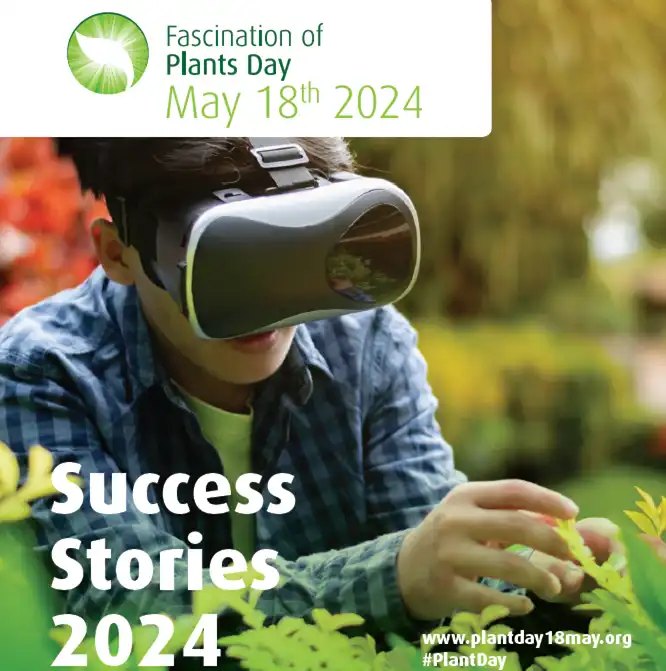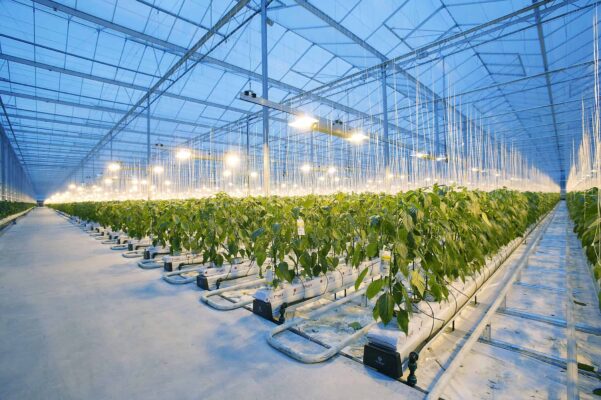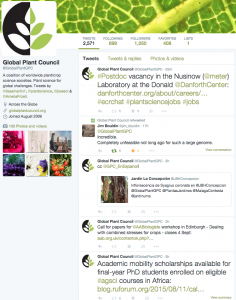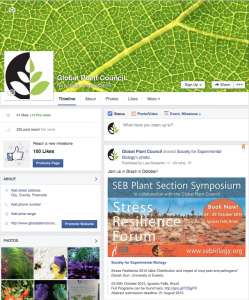



 – we’re even helping to develop a new social media platform just for plant scientists! As well as this blog, we also have two Twitter accounts: our main, English-language account is at @GlobalPlantGPC, to which myself (@lisaamartin1), Ruth (@plantscience), and GPC New Media Fellows Amelia (@AmeliaFrizell) and Sarah (@josesci) all contribute. Alternatively, if you speak Spanish we also have a Spanish-language account at @GPC_EnEspanol (operated by Ecuadorian-PhD-student-in-Germany Juan-Diego Santillana-Ortiz; @yjdso, who kindly translates our tweets).
– we’re even helping to develop a new social media platform just for plant scientists! As well as this blog, we also have two Twitter accounts: our main, English-language account is at @GlobalPlantGPC, to which myself (@lisaamartin1), Ruth (@plantscience), and GPC New Media Fellows Amelia (@AmeliaFrizell) and Sarah (@josesci) all contribute. Alternatively, if you speak Spanish we also have a Spanish-language account at @GPC_EnEspanol (operated by Ecuadorian-PhD-student-in-Germany Juan-Diego Santillana-Ortiz; @yjdso, who kindly translates our tweets).
We find Twitter a great way to share links, news, journal articles and conference updates, while also networking with the global plant science community. Join over 1000 other plant scientists and enthusiasts and follow us, if you’re not already!
If you’re not sure where to start with Twitter, Mary Williams from ASPB (@PlantTeaching) has written a great two-part blog (we feature in Part 1! And here’s Part 2) that will help you get started and understand the ‘twetiquette’ of tweeting, especially from conferences.
Although Facebook is by far the most popular social networking site across the globe, the way we use it has evolved dramatically since its inception in 2004. ‘Thefacebook’ as it was first known, was famously founded by Harvard University student Mark Zuckerberg as a way for his fellow students to view and comment on photographs of their dorm-mates. Initially restricted to Harvard, the website soon expanded to universities across the US, then the world, and now almost anyone can use it, even without an academic email address.
 But Facebook has moved on from its early days and it’s now not all about ‘poking’ your friends (remember that?!). Now worth billions of dollars, Facebook has morphed into an all-encompassing platform for both recreation and business. While many people still use Facebook to keep in touch with friends and family, share photos and status updates, it’s also increasingly being used to share news, articles and opinions, to play games, form groups or communities, and as a tool for companies and organizations to interact with and advertise to customers or members.
But Facebook has moved on from its early days and it’s now not all about ‘poking’ your friends (remember that?!). Now worth billions of dollars, Facebook has morphed into an all-encompassing platform for both recreation and business. While many people still use Facebook to keep in touch with friends and family, share photos and status updates, it’s also increasingly being used to share news, articles and opinions, to play games, form groups or communities, and as a tool for companies and organizations to interact with and advertise to customers or members.
At the Society for Experimental Biology conference in Prague in June, I heard several scientists extolling the benefits of social media, particularly – and perhaps unsurprisingly – in the Education and Outreach sessions. I was particularly interested to repeatedly hear the message that Facebook is a very useful tool for science communication and outreach – so we’ve decided to try it!
Having only ever used Facebook for personal uses, Sarah and I asked some prolific social media users for their advice on starting and using a Facebook page, and in answer to the question, “Why should we bother with Facebook?”, the overwhelming message was clear: Facebook is used by more, different people.
Compared to Twitter, which has around 316 million users, Facebook reached its 1 billionth account in 2012, and while the people we spoke to find that most of their Twitter followers are from English-speaking countries, their Facebook visitors represent a much broader range of geographic locations and languages. Furthermore, unlike setting up and maintaining a website, it’s free to set up Facebook pages or groups, so some organizations only exist on social media. By setting up a Facebook page for the GPC, we should, in theory, be able to interact with more people than we would with just our Twitter accounts and blog, thus we will be able to share and promote plant science all over the world more effectively and to a greater diversity of people.
If you’re attending our SEB Plant Section Symposium on Stress Resilience, you can also let us know by joining our Facebook event! (Please note however, that saying you’re coming to the meeting on Facebook is not the same as registering! You’ll need to do that here.)
Here’s a list of some of our Member Organizations who also have a presence on Facebook. Let us know if there are any other pages we should ‘like’! We’re also interested to hear from you if you have any thoughts about using social media, or suggestions of content you would like to see on Facebook. How do you use Twitter and Facebook, and how does your use of these channels differ, if at all? Please comment below!